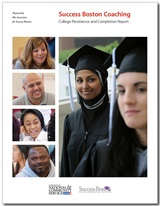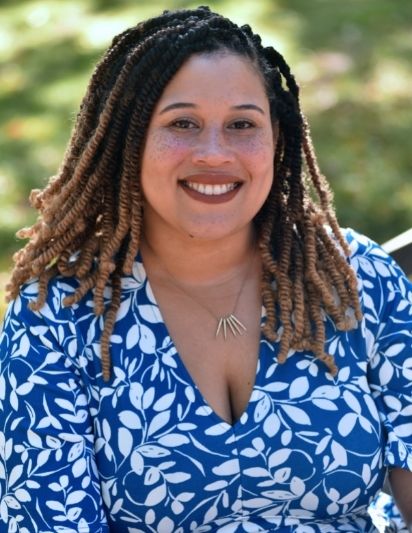As Boston Public Schools (BPS) College & Career Month draws to a close, we check in with the Boston Foundation’s Education to Career team to get to know its newest member, Program Officer Jade Franco. She will be leading the team’s Success Boston work, including convening the coaches’ network, collaborating with Success Boston’s nonprofit and higher education partners, managing the data and more.
Q: You were involved in Success Boston even before joining the Boston Foundation in September. Tell us a little about that journey.
I was introduced to Success Boston in 2013 when I started working at Sociedad Latina, one of our nonprofit coaching partners, which focuses on creating the next generation of Latino leaders through education, workforce, civic engagement and arts and culture programming. I’d had a passion for youth empowerment and educational equity for many years at that point, and my time at Sociedad Latina deepened that. From 2013 to 2017, as a Program Coordinator at Sociedad Latina, I was also a Success Boston Coach and represented the organization at Success Boston convenings. I was promoted to Manager of College & Career Pathways in 2016 and became more involved in collecting and interpreting Sociedad Latina’s data on our coaching, and frequently interacted with the Boston Foundation’s Education team to give progress reports.
I’m thankful for my experiences at Sociedad Latina and as a coach because it prepared me to be a strong student advocate and empathetic financial aid counselor at Boston University (2017–2021). Joining the Boston Foundation feels like a full-circle moment in my career. I am honored to be in the position to influence the Success Boston initiative and help shape its future.
I’ll always have a soft spot for Sociedad Latina and I’m happy that in my current role I can continue to build on the relationships I established there. I am also excited to deepen relationships across the education nonprofit sector and higher ed institutions throughout the Commonwealth. It’s been a delight to lead our monthly Success Boston Coaches Network meetings and see so many familiar (and new!) names and faces who are just as dedicated as I am to supporting BPS graduates in completing college degrees.
Q: Did you grow up around here? What was your school experience like, and how might it have been different had you had a coach?
I’m a proud Boston gal! My family and I immigrated from the Dominican Republic to Boston in 1991, and we have called this city our home ever since. Funny enough, I do not have a “typical” Boston accent. My theory is that my Spanish accent as a kid may have canceled it out by the time I fully learned English. I attended Boston Public Schools for K–12, culminating at Boston Latin Academy—one of the city’s three competitive exam high schools. I would have benefitted strongly if I’d had a college success coach during my high school and college years. It is a misconception that students admitted to Boston’s exam schools are all doing great and do not need additional support services. I and many of my peers came from single-parent, low-income households in public housing. I knew students at Latin Academy who were facing homelessness, domestic violence, substance abuse issues and much more while juggling difficult academic demands. We had to overcome many of the same obstacles non-exam school students faced that kept us all from accessing opportunities available to our wealthier peers in the suburbs.
I struggled with the social and emotional transition from high school to college, just as many of our Success Boston students do. While at Stonehill College, I often questioned whether I belonged; if I was abandoning my culture or identity as an Afro-Latina by studying at a private, predominately White institution; or if my efforts to complete a college degree would even translate into reaching the middle class in my adulthood. Having a coach in those formative years would have helped me work through that self-doubt and “imposter syndrome” more quickly.
Q: It’s so valuable that you’ve seen the field from so many angles! What’s one thing you wish people knew about Success Boston that they generally don’t know?
The Success Boston initiative is not only an amazing collaboration across private and public institutions to increase college graduation rates for BPS graduates, but it is also an excellent networking and professional development space for our city’s educators, youth workers and higher education administrators. I always look forward to each Coaches’ Meeting because it is a space where like-minded colleagues are incredibly supportive of one another. While I was a Success Boston Coach, meeting the dozens of coaches across the network and learning from their experiences broadened my own student counseling, increased my confidence as a coach when I had a difficult student situation and educated me on current news and trends in K–12 and higher education.
Q: What’s on the horizon for Success Boston?
We’re wrapping up #BPSCollegeMonth now and, looking back, the highlight was co-hosting the 15th annual BPS College, Career & STEM Expo in partnership with the district on October 16. Due to the pandemic, we hosted the event outdoors. Thankfully, the weather was pleasant, and we had more than 300 students and families attend the fair! That bodes well for the future, I think.
As for what’s on the horizon, Success Boston—along with our other education initiatives—will continue to evolve as the Boston Foundation develops and launches a new strategic plan. Success Boston as an initiative is also refining its strategic plan, which will include an explicit and intentional commitment to having equity guide our work with Boston’s young people. I’m excited to join the team at this critical, transitional point as we consider how to more effectively center equity and address societal issues such as institutional racism, classism, sexism, ableism, etc. in all of our efforts.



